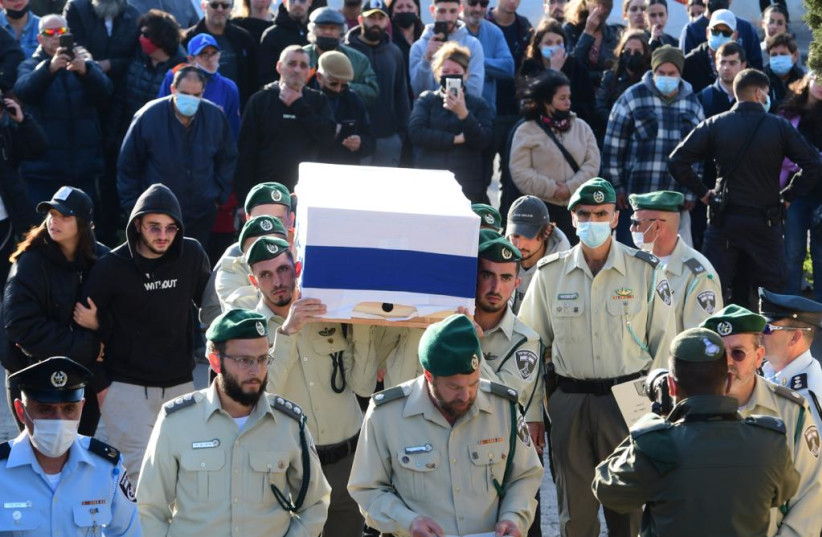Security forces braced for increased violence prior to Ramadan beginning Saturday night, as the unrest moved to the West Bank on Thursday, with a terrorist attack on a Gush Etzion settlement and an IDF-Palestinian firefight in Jenin.
Security forces are concerned by possible incidents by both Palestinian and Jewish extremists that could inflame tensions and continue the wave of terrorism of the last week, in which 11 people were killed in three separate attacks inside sovereign Israel.
The country remained on high alert, as security personnel embarked on “Operation Breaking the Wave” to prevent an outbreak of a third intifada.
“We are in a very sensitive period,” Defense Minister Benny Gantz told Channel 11 Thursday night. The IDF increased its forces at the start of this week and continued to add additional soldiers during the week, he said.
The army, the intelligence service and the police are the bodies responsible for ensuring civilian safety, Gantz said when pressed about Prime Minister Naftali Bennett’s call on Wednesday for civilians with gun licenses to carry arms.

Bennett said he planned to allocate an additional NIS 181 million for emergency funds for the police, including for recruiting new police officers and establishing a new Border Police brigade.
“[A] strong police [equals a] strong State of Israel,” Bennett said. “We [will] work with all the tools and in all the arenas to restore safety and a sense of security to the citizens of Israel.”
Security forces are focused in particular on Jerusalem’s Temple Mount, also known as al-Haram al-Sharif, fearing the impact of violence in that religiously sensitive area, where Muslims will flock to worship during Ramadan. Jews are allowed to visit the Temple Mount but are not allowed to pray there.
To underscore the importance of a Jewish presence on the Temple Mount, Religious Zionist Party MK Itamar Ben-Gvir strode across the plaza in front of the Dome of the Rock.
“Israel must not cave to terrorists who want to kill us all,” he said.
“Weakness invites terror,” Ben-Gvir said, adding that those who control the holy site, control Israel. “Even the enemy understand this.”
The increased measures did not prevent a Palestinian terrorist from stabbing a passenger in his 30s with a screwdriver, seriously wounding him, before another passenger shot and killed the attacker.
Earlier in the day, soldiers came under Palestinian fire when arresting suspects in the Jenin refugee camp. Troops responded with live fire, killing two Palestinians and wounding 15 others. The Palestinian Authority Health Ministry identified the dead as Sanad Abu Atiyeh, 17, and Yazid Saadi, 23.
Wafa, the Palestinian news agency, said 14 of the wounded were hit by live fire.
The Palestinian terrorist who killed five people in Bnei Brak on Tuesday, including three Israelis and two Ukrainians, had lived in the village of Yabad, near Jenin.
Soldiers and Border Police officers entered the Jenin refugee camp to “apprehend terrorist suspects,” the IDF said.
“During the operation, terrorists opened fire at our forces,” it said. “Israeli troops returned fire that struck the gunmen. An Israeli soldier was slightly wounded.”
Palestinian Authority President Mahmoud Abbas said in a statement: “Continued raids and daily killings of our people and the daily crimes by settlers will lead the region toward more tension and escalation.” On Wednesday, he condemned the Bnei Brak attack.
On Thursday, St.-Sgt. Amir Khoury, 32, the hero policeman who was killed in a shootout with the Bnei Brak terrorist, was buried in his hometown of Nof Hagalil (Upper Nazareth).
“My son, my heart hurts,” Khoury’s father said at the funeral. “On Tuesday, you bade me farewell with a hug and said you would return home on Friday. You came back earlier in a coffin.”
Bennett, who is suffering from COVID-19, eulogized Khoury on Twitter, calling him an “Israeli hero” who “stormed forward and saved the lives of others... Now he has been brought to rest.”
Late Thursday night, US President Joe Biden called Bennett to offer condolences.
“The President emphasized that the United States stands firmly and resolutely with Israel in the face of this terrorist threat and all threats to the State of Israel,” the White House said in a statement.
“The violence must stop,” US Ambassador to Israel Tom Nides told Channel 11.
Reuters and Maariv contributed to this report.
